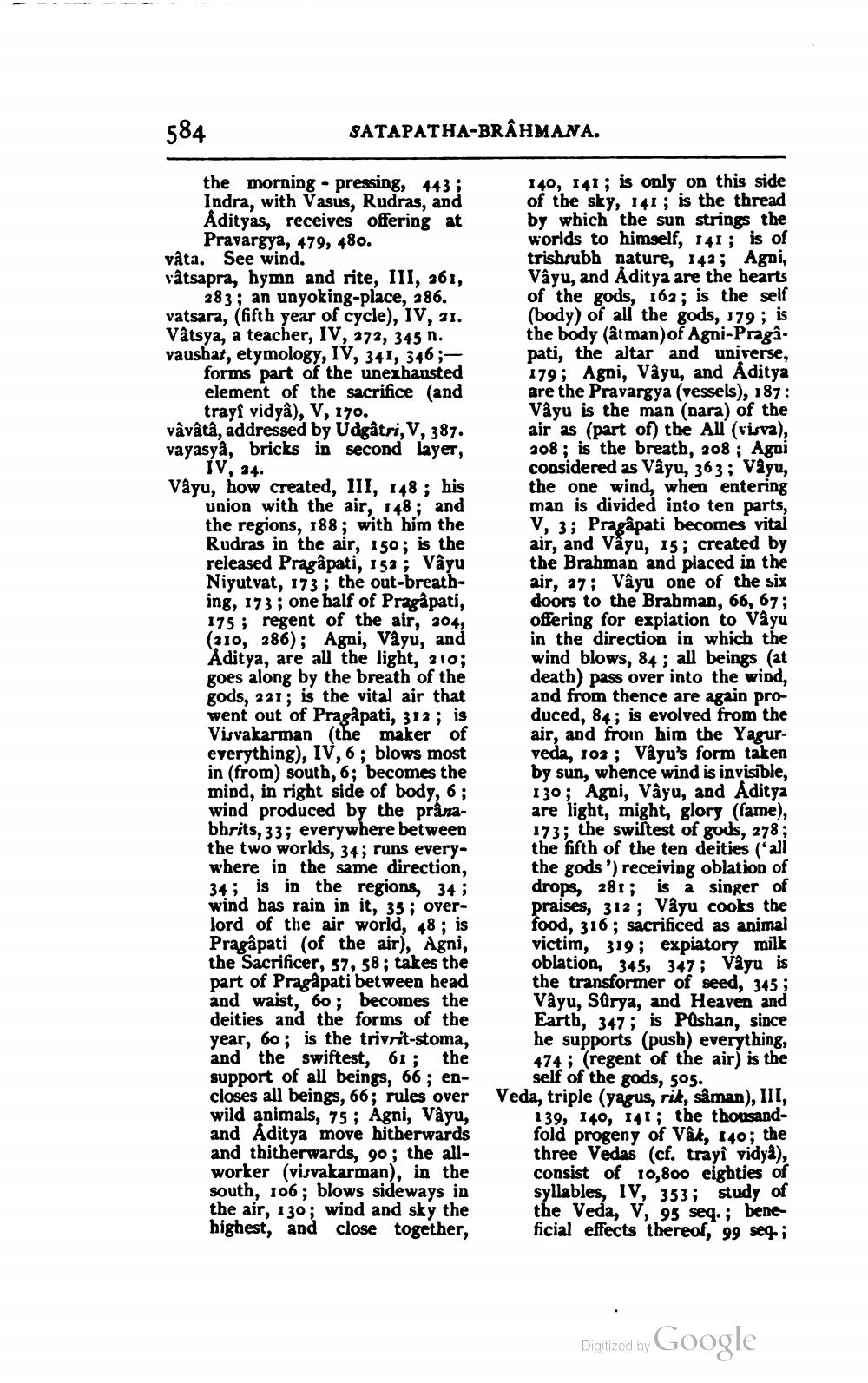________________
584
SATAPATHA-BRAHMANA.
the morning - pressing, 443; Indra, with Vasus, Rudras, and Adityas, receives offering at
Pravargya, 479, 480. vậta. See wind. vatsapra, hymn and rite, III, 361,
283; an unyoking-place, 286. vatsara, (fifth year of cycle), IV, 21. Vâtsya, a teacher, IV, 272, 345 n. vaushat, etymology, IV, 341, 346;--,
forms part of the unexhausted element of the sacrifice (and
trayi vidya), V, 170. vâvâta, addressed by Udgâtri, V, 387. vayasyà, bricks in second layer,
IV, 24. Vậyu, how created, III, 148 ; his
union with the air, 148; and the regions, 188; with him the Rudras in the air, 150; is the released Pragapati, 152; Vâyu Niyut vat, 173; the out-breathing, 173; one half of Pragapati, 175 ; regent of the air, 304, (210, 286); Agni, Vågu, and Åditya, are all the light, 210; goes along by the breath of the gods, 221; is the vital air that went out of Pragapati, 312; is Visvakarman (the maker of everything), IV, 6; blows most in (from) south, 6; becomes the mind, in right side of body, 6; wind produced by the pranabhrits, 33; everywhere between the two worlds, 34; runs everywhere in the same direction, 34; is in the regions, 34; wind has rain in it, 35 ; overlord of the air world, 48; is Pragâpati (of the air), Agni, the Sacrificer, 57, 58; takes the part of Pragapati between head and waist, 60; becomes the deities and the forms of the year, 60; is the trivrit-stoma, and the swiftest, 61; the support of all beings, 66; encloses all beings, 66; rules over wild animals, 75 ; Agni, Vayu, and Aditya move hitherwards and thitherwards, 90; the allworker (visvakarman), in the south, 106; blows sideways in the air, 130; wind and sky the highest, and close together,
140, 141; is only on this side of the sky, 141; is the thread by which the sun strings the worlds to himself, 141; is of trishrubh nature, 142; Agni, Vâyy, and Åditya are the hearts of the gods, 162; is the self (body) of all the gods, 179; is the body (âtman)of Agni-Pragapati, the altar and universe, 179; Agni, Vayu, and Aditya are the Pravargya (vessels), 187: Våyu is the man (para) of the air as (part of the All (visva), 208; is the breath, 208 ; Agui considered as Vâyu, 363; Väyu, the one wind, when entering man is divided into ten parts, V, 3; Pragapati becomes vital air, and Vàgu, 15; created by the Brahman and placed in the air, 37; Vậyu one of the six doors to the Brabman, 66, 67; offering for expiation to Vâyu in the direction in which the wind blows, 84; all beings at death) pass over into the wind, and from thence are again produced, 84; is evolved from the air, and from him the Yagurveda, 103 ; Vậyu's form taken by sun, whence wind is invisible, 130; Agni, Vâyu, and Aditya are light, might, glory (fame), 173; the swiftest of gods, 278; the fifth of the ten deities (all the gods') receiving oblation of drops, 281; is a singer of praises, 312; Vậyu cooks the food, 316; sacrificed as animal victim, 319; expiatory milk oblation, 345, 347; Vayu is the transformer of seed, 345; Vayu, Sarya, and Heaven and Earth, 347; is Pashan, since he supports (push) everything, 474 ; (regent of the air) is the
self of the gods, 505. Veda, triple (yagus, rik, såman), III,
139, 140, 141; the thousandfold progeny of Våk, 140; the three Vedas (cf. trayi vidya), consist of 10,800 eighties of syllables, IV, 353; study of the Veda, V, 95 seq.; beneficial effects thereof, 99 seq. ;
Digitized by Google




